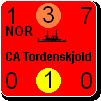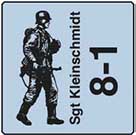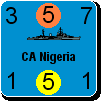Greyshaft
Posts: 2252
Joined: 10/27/2003
From: Sydney, Australia
Status: offline

|
Aged 47 in 1939. Field Marshall Erwin Johannes Eugen Rommel wanted to be an engineer but his father opposed the idea so in 1910 Rommel enrolled in the Gerrman Army. He fought in France and in Italy, rising from Lieutenant to Captain and winning the Iron Cross (First and Second Class) and Prussia's highest medal, the Pour le Mérite, along the way. After WWI he remained in the Army as an instructor at the Infantry School in Dresden and later at the Potsdam War Academy. In October 1935 he was promoted to the rank of lieutenant colonel and after Hitler read his 1937 book 'Infantry Attacks' Rommel was appointed to command Hitler's HQ staff during the Austrian, Czechoslovakian and Polish campaigns. In 1940 Rommel commanded the 7th Panzer Division, nicknamed the 'Ghost' division because the enemy (and often his superior officers) did not know where he was. Rommel's panzers lead the breakthrough from the German border to the Channel and then travelled down the French coast to the Spanish border. He was promoted to General and sent to command the Deutsches Afrika Korps which was forming in Africa. The next two years saw Rommel battling Generals Wavell, Auchinleck and Montgomery in a see-saw battle along the African coastline from Tunis to El Alamein. Rommel won many of the battles but lost the crucial round against Montgomery at the second battle of El Alamein and was forced to retreat back to Tunisia. After falling sick he was repatriated to Europe and escaped the final surrender of the Afrika Korps. After a period of recovery Rommel was appointed as commander of Army Group B in France with specific responsibility for coastline defence. The task was enormous but Rommel threw himself into it. He disagreed strenuously with Hitler's decision to hold armored units as a central reserve arguing that Allied air superiority would prevent the movement of reserves to the invasion beaches. Despite Rommel's best efforts the Allied invasion of Normandy succeeded. On July 17th, 1944 Rommel's staff car was strafed by a RCAF Spitfire, and he was hospitalized with major head injuries. The failure of the July 20th plot against Hitler lead to a far-reaching enquiry and purging of the German officer corp. When Hitler found out that Rommel had known of the plot but not reported it, he offered Rommel the choice between a public trial (with inevitable conviction and subsequent execution), or a private suicide with a State Funeral. Rommel chose suicide. Ironically Rommel had been asked to join the plot but had refused, preferring that Hitler be arrested rather than assassinated. Rommel's strengths were his undoubted tactical genius and his ability to inspire his men. There is some evidence that Rommel's victories in Africa were more a result of accurate pre-battle intelligence than an intuitive ability to determine and foil the intentions of his enemies during the battle, but this does not detract from the Rommel legend.(489)
< Message edited by Greyshaft -- 1/13/2006 9:05:04 AM >
_____________________________
/Greyshaft
|
 Printable Version
Printable Version















 New Messages
New Messages No New Messages
No New Messages Hot Topic w/ New Messages
Hot Topic w/ New Messages Hot Topic w/o New Messages
Hot Topic w/o New Messages Locked w/ New Messages
Locked w/ New Messages Locked w/o New Messages
Locked w/o New Messages Post New Thread
Post New Thread